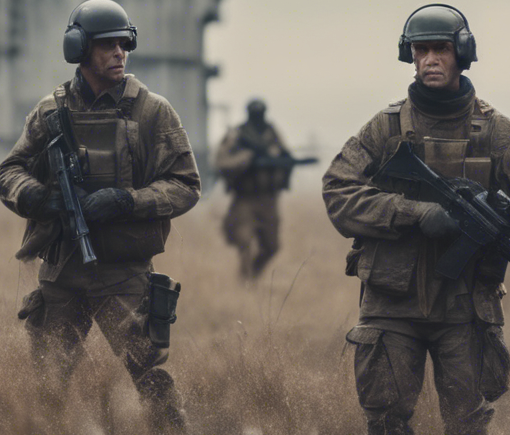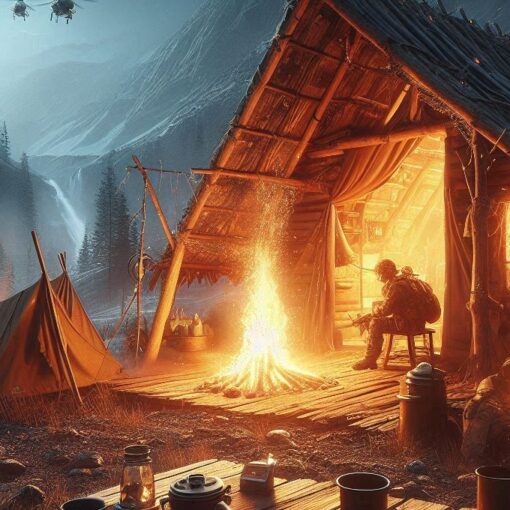Top Takeaways and Key Concepts
- Stay aware of surroundings to detect threats early and avoid dangerous situations.
- Use strong body language and loud commands to deter attackers and draw attention.
- Learn simple escape moves to break free from grabs and create distance quickly.
- Use everyday objects as tools for self-defense when necessary.
- Practice regularly to build confidence, quick reactions, and mental control under pressure.
Summary of This Article
This article explains why self-defense is an essential survival skill for both outdoor adventures and everyday life. It emphasizes the importance of situational awareness, confident posture, and using verbal commands to prevent attacks before they escalate. The article also highlights simple techniques anyone can learn to escape danger, the usefulness of improvised weapons like keys or sticks, and the importance of staying calm through mental preparedness. Finally, it encourages regular practice to build the confidence and skills needed to stay safe in unpredictable situations.
Short Video Version of this Article
Being ready to protect oneself can greatly help in a world when anything can happen. It’s equally as crucial as learning how to get clean water or build a fire. Really, think about it. You feel more confident when you can maintain your ground, whether you’re trekking in the woods or just going about your regular life.
Please Note: This post may contain affiliate links. If you click one of them, we may receive a commission at no extra cost to you. As an Amazon Associate, I earn from qualifying purchases.
You’re on a trail, taking in the vista, and something doesn’t feel right. Being able to defend yourself can make you feel safer. And the same talents can aid you if you ever feel nervous when you get back to the city.
So, lace on those comfortable hiking boots. We’re going to talk about some easy ways to protect yourself that anyone may use. You don’t have to be a black belt or anything. Some simple, useful things to keep in mind.
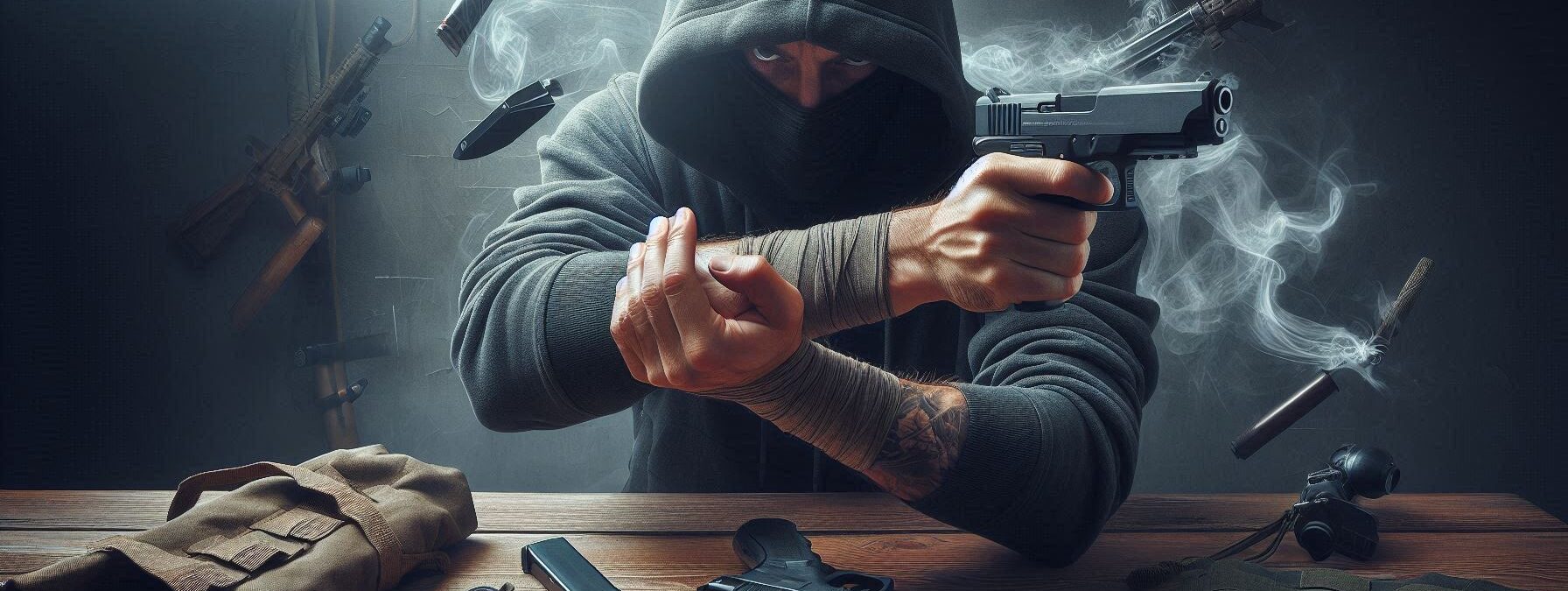
First, pay attention to what’s going on around you. If you walk with your head held high and look about, it demonstrates that you are sure of yourself. It can stop people who intend to cause problems from doing so.
If you need to, you should know how to produce a loud noise. Yelling can get people’s attention. A good shout can really change everything.
Learn a few maneuvers, such how to get away if someone grabs your arm. It’s all about being ready. Also, having these talents can make you feel more sure of yourself. And having confidence is the most important thing!
Keep in mind that it’s not about fighting. It’s about getting away and being safe. Every small talent counts.
So, let’s work together to get stronger. A good survivalist knows how to defend themselves. And who knows? You might even like it!
Understanding Your Surroundings
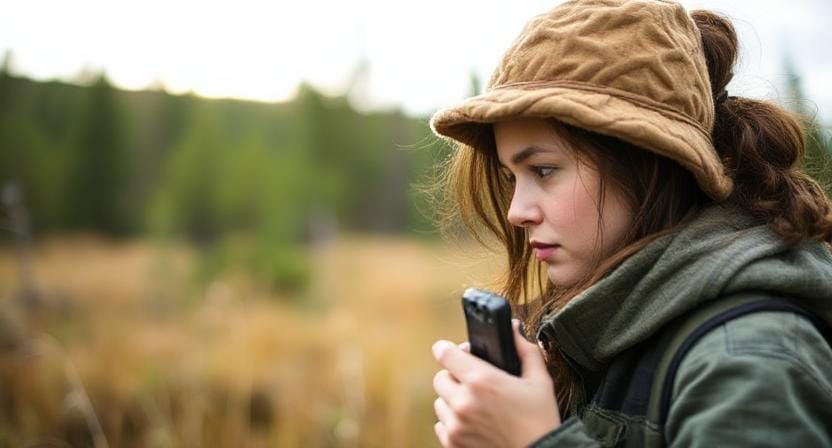
First of all, being aware is your best buddy. When was the last time you were so focused your phone that you almost ran into a tree? It happens! But being aware of your surroundings can help you recognize possible risks before they become serious problems, whether you’re in nature or just going through a metropolis.
Did you know that animals are often better at noticing what’s going on around them than people are? We can learn a lot from our furry pals if they can pick acorns and avoid traffic at the same time.
Look around you a lot at first. Just take a second to look about you. Are there any unusual movements? Is there anything that doesn’t fit? Like how that bush shakes when everything else is quiet. It could be a nice animal or something else. If anything feels wrong, you might want to be wary and stay away.
Being mindful doesn’t have to be all serious all the time. It can be entertaining, in fact! You may make it a game. Try to find five objects around you. “I see a blue jay, two people hiking in funny shoes, and look at that tree!” It looks just like my Uncle Bob with his wild hair!
Making things fun not only keeps you interested, but it also sharpens your intuition. It’s fun to see new stuff. You might find a gorgeous flower or a unique rock that you’ve never seen before.
And don’t forget about the sounds. Pay close attention. Is that the breeze or a bird singing? It gets easier the more you pay attention. You’ll soon feel very sure that you know what’s going on around you. It’s like having a magic power.
So, let’s be alert and keep our thoughts fresh. Being attentive helps keep us safe and makes adventures more fun, after all!
Basic Defensive Techniques
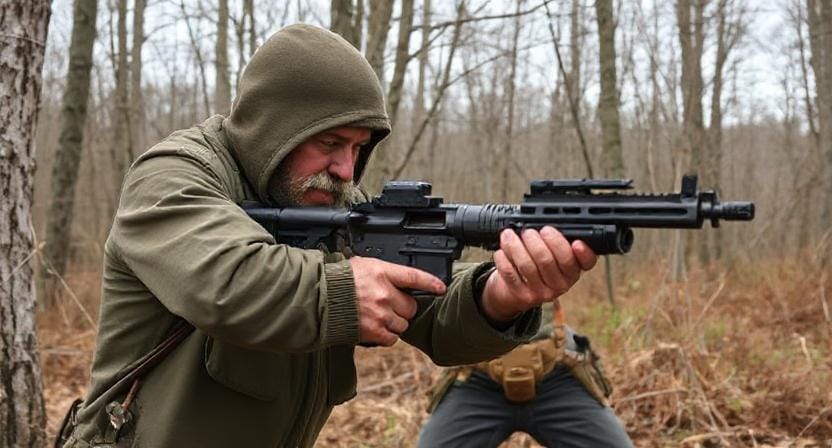
Let’s talk about some fundamental ways to defend yourself now that we’ve spoken about being mindful. You don’t have to be Bruce Lee to protect yourself; sometimes all it takes to get out of a tough spot is a few easy techniques.
If someone comes up to you aggressively, maybe because they think you’re their long-lost twin, consider using distance to your advantage.
When someone gets too close, it’s time to back off. You could think of it as a weird game of musical chairs without the music. Making room can make you feel safer.
Body language is also important. You mean business when you stand straight with your shoulders back. It’s like saying, “I’m not here to cause trouble!” Your posture can have a major effect. People see it. It can even make someone think twice before messing with you.
Let’s talk about yelling now. A big, loud shout can truly get people’s attention. Think of it as a superpower you have. It can stop someone far faster than being nice. Practice saying things like “Help!” or “Back off!” until they’re loud enough to wake up bears from their sleep. For real. You want to be heard.
You may even picture yourself on a gigantic stage! Let it out and stand tall. You could feel a little stupid, but that’s okay. It’s a good idea to get your voice ready.
Keep in mind that these easy steps might help you feel more in control and sure of yourself. You have a lot of skills, like a toolbox. You hope you never have to use them, but it’s good to have them just in case. Let’s keep training so we may feel safe on our excursions!
Using Everyday Items as Weapons
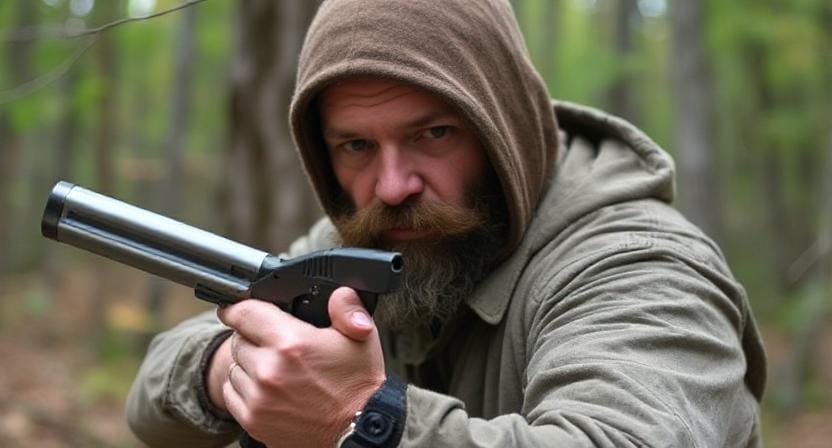
You might be amazed at how many things you use every day can also be used as weapons. Did you realize, for example, that a pen may save your life?
When things get very bad, it turns from a writing tool into a weapon, or at least something sharp enough to poke someone’s eye out (not recommended until absolutely necessary).
You know the trick with the car keys? It’s quite cool. If you hold your keys between your fingers, they can become improvised brass knuckles. Very helpful when you feel stuck. Be careful! Aim carefully, because no one wants to have a sore hand or a broken keychain.
It’s important to be creative with what you have—do you see what I did there? Also, when you’re outside, seek for strong branches. They can turn into your own “wooden sword.” You’d be shocked at what you can find. There are always surprises in nature!
Picture yourself on a hike and seeing a strong stick. You can use that stick to assist you stay balanced, protect yourself, or perhaps clear any shrubs that are in your way. It’s like having a buddy that is always ready to help!
Keep your eyes open the next time you go out to see new things. Check out what’s around you that could help. A pine cone? Great for getting your mind off things. A stone? Great for standing your ground. Don’t ever take for granted what’s right in front of you.
Being observant and coming up with new ideas can make any outing an adventure! And it makes you feel like a hero in your own story. So go ahead and let your inner explorer out!
Mental Preparedness – Staying Calm Under Pressure
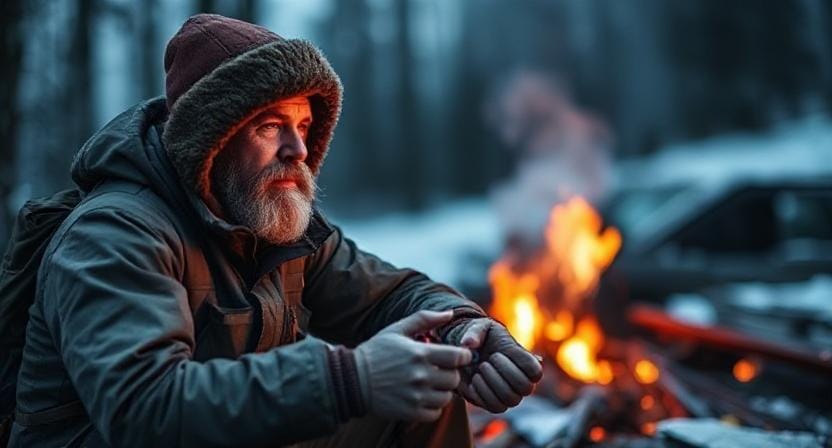
Okay, everyone, here comes what might be the most important part of self-defense: being mentally ready. When you’re in danger or in a fight, it’s important to be calm. Panicking will only cause you to make bad choices (and maybe even trip over roots).
Getting ready for high-stress situations ahead of time is like training for the Olympics, except instead of gold medals from judges in tuxedos, you get trophies made of twigs and leaves!
It might be quite helpful to practice visualization skills. Think about several times when you could require your skills. Think of how a superhero would deal with them. You have faith in yourself. You can do this.
It’s also a little fun! Close your eyes and see every small thing. You can almost feel how well you’re doing, right? It’s like a little movie is playing in your thoughts.
Breathing exercises are also very useful. They really do settle your anxiety faster than a lovely puppy jumping into your lap. Just think about it. You may feel your body relax when you take deep breaths.
Take a breath through your nose. Get full like a balloon. After that, carefully let the air out, like letting the air out of a balloon after a party that got a bit too crazy! Let that stress go away.
When things become a little crazy, don’t forget to breathe. You might feel more in control when you find that rhythm. It’s like giving yourself a hug from the inside.
So the next time you’re not sure or worried, just stop for a second. Picture yourself becoming successful and take deep breaths. You can believe me that you’ll feel the difference! You can do this because you are stronger than you think.
Training Regularly – Keeping Skills Sharp
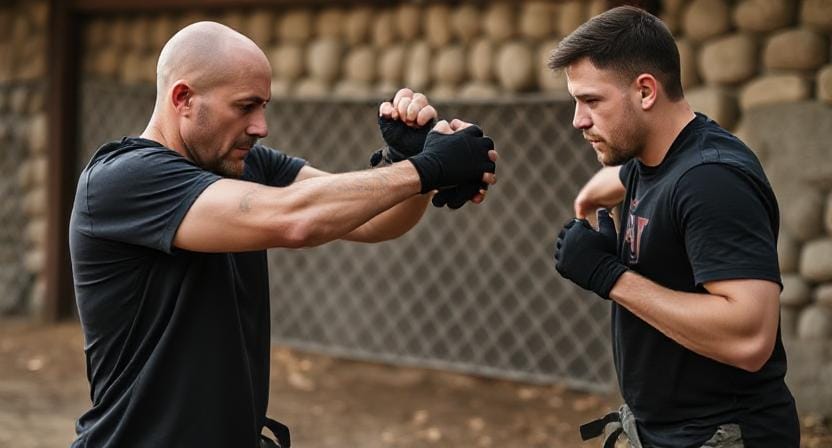
Just like any other skill set worth having—self-defense requires regular practice! Consider enrolling in local martial arts classes or self-defense workshops where instructors teach practical techniques tailored specifically toward survivalists (and also provide ample opportunities for embarrassing moments when attempting high kicks).
If you can’t take formal classes right now, that’s totally okay! You can make your own training sessions outdoors. Grab some friends who are into the same stuff. Imagine you’re all ninjas battling invisible bad guys. It’s a blast! Just try not to giggle too much.
Being outdoors makes everything more fun. Plus, it’s a great way to bond. You can practice together, cheer each other on, and share those silly moments. Who doesn’t love a good laugh, right?
Even if you’re alone, practicing those stances or movements while hiking can really help. Just imagine you’re training for the big leagues! Every little bit counts. Moving your body in different ways can prepare you for real challenges later.
It doesn’t have to be serious. Make it playful. Jump around, strike poses, and even throw in some ninja sounds if you feel silly!
These moments can build your confidence. You’ll feel strong, and it’ll make you ready for whatever comes your way. Just have fun with it! You’re growing, learning, and preparing, all while enjoying the fresh air. Isn’t that awesome?
Conclusion – Embrace Your Inner Warrior
So let’s get started! Self-defense can be as simple as eating trail mix while hiking. Awareness of your surroundings? That involves being very aware of what’s going on. Pay attention to everything around you. It’s like a game! Look for squirrels, check the clouds, and maybe even locate an interesting stick.
It also helps to know some basic skills. They let you choose what to do if something goes wrong. You move with a purpose. It’s not about being tough; it’s about being smart and prepared. And don’t forget that everyday things can help. Your keys can be your hidden weapon, or that strong stick you found can be your loyal sidekick.
Putting everything together makes you feel more sure of yourself. Having a strong mind and good physical talents is like having a warrior spirit. You’re ready for anything nature throws your way.
Do you feel the thrill? Every new adventure is a chance to get stronger, both inside and out. You’re not just going on a hike; you’re becoming better! So, let’s enjoy every second. Keep learning, keep practicing, and always remember that you can do this!
Self-defense is an essential life skill that boosts personal safety and confidence in any environment. By staying aware, using assertive body language, learning simple escape techniques, and staying mentally prepared, anyone can better protect themselves. Practicing regularly builds muscle memory and quick reactions that may save your life.
Frequently Asked Questions
What is the most important rule of self-defense?
The primary goal of self-defense is to escape safely, not to fight. Your objective should always be to create distance and reach safety as quickly as possible.
How does situational awareness help prevent danger?
Situational awareness allows you to spot potential threats early by staying alert to people, behavior, and surroundings, giving you time to avoid danger before it escalates.
Do I need martial arts training to defend myself?
No, self-defense focuses on simple techniques anyone can learn, such as breaking free from grabs, using your voice, and creating distance from threats.
What everyday objects can be used for self-defense?
Common items like keys, pens, flashlights, and sticks can be used as improvised defensive tools to strike, distract, or create an opportunity to escape.
How can I stay calm during a confrontation?
Controlled breathing, mental rehearsal, and confidence in basic techniques help reduce panic and improve decision-making during stressful situations.
Why is using your voice important in self-defense?
Shouting commands like “Stop!” or “Back off!” can startle an attacker, attract attention, and signal confidence, making you a more difficult target.
How often should I practice self-defense skills?
Regular practice, even just a few minutes weekly, helps build muscle memory and quick reactions so you can respond instinctively in real situations.
Suggested External Resources:
Self-Defense Tips
https://www.wikihow.com/Defend-Yourself
The Basics of Self-Defense
https://www.selfdefensezone.com/basics-self-defense
Martial Arts Techniques
https://www.martialartsplanet.com/techniques

Kevin Collier is a seasoned outdoor enthusiast and writer for Trekbug.com, specializing in outdoor adventures, survival strategies, and prepping insights. With a deep love for nature and a commitment to self-sufficiency, Kevin empowers readers to embrace the wilderness confidently. He shares valuable tips, practical techniques, and inspiring stories, helping both novice and experienced adventurers develop essential skills for surviving and thriving in the great outdoors.


